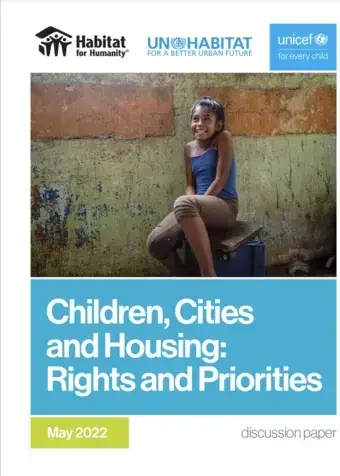
Adequate housing is a right of every person — regardless of age, gender, race or income level — and is the foundation for all human development, well-being and survival, as recognized by Article 25 of the Universal Declaration of Human Rights, or UDHR.
As a leading global organization committed to adequate housing for all, Habitat has collaborated with the UN-Habitat and UNICEF on a discussion paper, Children, Cities and Housing: Rights and Priorities that examines the challenges children in urban areas face because of poverty and the inadequacy of their housing. The paper, presented at the Eleventh Session of the World Urban Forum in 2022, also shares strategies to better realize children’s rights as enshrined in the U.N. Convention on the Rights of the Child to enable a sustainable future for not just children but all humanity.
Children living in poverty and inadequate housing are arguably one of the most vulnerable groups globally because of multidimensional poverty and their dependence on others and their surrounding environment to meet their basic survival and development needs. Children’s well-being — including their cognitive development, health and education — is significantly impacted by the quality of their housing. Children living in inadequate housing are often more vulnerable to disasters, climate change, conflict and global pandemics.
Although inadequate housing exists in both urban and rural settings, research into the so-called “urban advantage” demonstrates that in many countries the most disadvantaged children in urban areas are worse off than children in rural areas. Additionally, adequate housing is central to achieving socially just, economically viable, healthy and environmentally friendly and sustainable cities, as envisioned in the United Nation’s Sustainable Development Goals and New Urban Agenda.